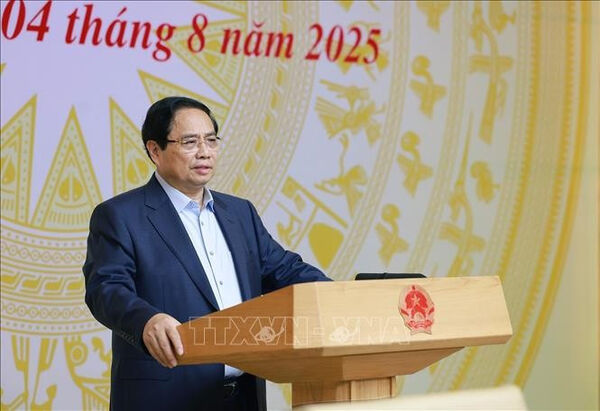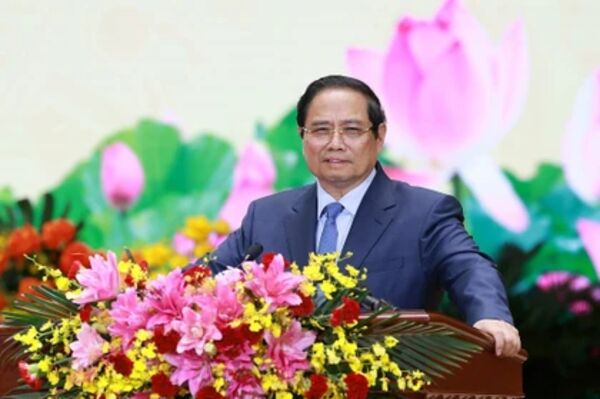 |
| Workers sew export garments at Hung Yen Jute and Garment JSC. (Photo: VNA) |
Hanoi (VNA) - For Vietnam, the journey to establish a national brand in the digital space requires a sharp strategic vision, bold innovation, and a tightly connected ecosystem involving the State, enterprises, and the community, experts have said.
Vietnam is now entering an era in which the boundaries of time and space are increasingly blurred by technologies. While the first two decades of the 21st century witnessed a race among traditional brands, where physical products were recognised through logos, packaging, or promotional campaigns, today marks the era of digital brands, where core values are built and spread through technologies, data, and digital experiences.
According to experts, in an age of intense globalisation, a national brand is no longer merely a cultural or economic image. It also represents a commitment to the quality and values a country offers the world.
Vietnam’s digital economic picture in 2025 is laying a solid foundation for affirming its national brand on the international stage. With a population of over 101 million and a mobile connection rate exceeding 126%, equivalent to 127 million subscriptions, Vietnam demonstrates the strength of a dynamic digital society, where technological infrastructure serves as a bridge linking all aspects of the economy, culture, and daily life.
Vu Dang Vinh, CEO of Vietnam Report JSC, noted that 79.8 million Vietnamese people are using the internet, accounting for 78.8% of the population, and there are 76.2 million social media accounts, equivalent to 75.2% of the population, an increase of 3.5 million accounts in just one year. These figures reflect not only an impressive pace of digitalisation, but also the rise of social media as a key channel of interaction, where brand stories are formed, shared, and spread at unprecedented speed.
Notably, each internet user in Vietnam spends an average of six hours online per day, including more than three hours on mobile devices and over two hours on social media platforms. This presents favourable conditions for the national brand to make its mark, connect with the world, and affirm its identity.
Alongside the growth in digital connectivity, e-commerce has emerged as a key pillar in positioning the Vietnamese brand in the eyes of international consumers.
Vietnam’s national brand, propelled by digital transformation, is no longer simply a label indicating product origin. It has become a strategic asset that reflects the trust, sustainability, and creativity of the entire nation. The harmonious integration of cultural identity, product quality, and technological strength is forming a solid foundation that allows Vietnam not only to participate in, but also to shape the playing field of the connected economy, where commerce, services, production, and communications are all deeply intertwined through data and digital platforms.
The mergence of provinces and cities is not only an administrative reform but also a strategic restructuring of the country’s development space. From this, key economic regions are expanding not only in scale but also in identity, where potential in terms of infrastructure, resources, and culture is being interconnected to create stronger momentum for sustainable growth. This redrawing of the administrative map opens up interregional development opportunities, helping to optimise resources, reduce overlapping governance, and create favourable conditions for economic activities, investment, and services, Vinh stressed.
Within this context, digital brands play a central role in enabling each locality to assert its unique identity while contributing to the overall national brand. This transition requires localities to go beyond physical infrastructure and policies, and to “tell their stories” creatively, leveraging the power of data, digital platforms, and modern communications technologies.
Local administrations are urged to take the initiative in formulating data digitalisation policies, developing digital infrastructure, and attracting technological investment. Meanwhile, businesses must become the drivers of innovation, capitalising on the integrated space to expand value chains and bring their products and services to global markets via digital channels.
Nguyen Anh Tuan, Co-founder and Co-chair of the Boston Global Forum, observed that building a global digital brand is key to the sustainable development of Vietnamese enterprises in the era of artificial intelligence.
He pointed to two essential elements that every business must prepare in the digital age: first, the rational allocation of financial resources to digital brands and AI projects to avoid fragmented investment; and second, the cultivation of a creative workforce capable of connecting with international talent networks, paving the way for the development of digital brands as a sustainable foundation for every enterprise./.










